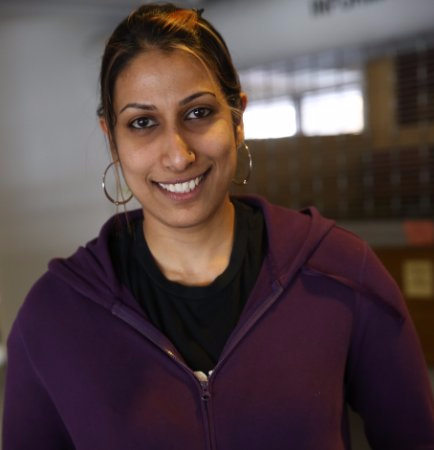
Liva is a human rights and migrant rights defender. Major organisations draw on her experience and expertise. These include the International Labour Organization, International Organization for Migration, United Nations Office on Drugs and Crime, Liberty Shared, and other local Malaysian NGOs.
Liva’s interest in human rights work began at a young age when she witnessed an incident of domestic violence in her home perpetrated by the husband of her family’s part time Malaysian domestic worker. “That day made me realise that there’s something really wrong with the way women are treated in this world,” she says.
Liva saw that female migrant domestic workers were especially vulnerable to abuse and lacking protection and she determined that promoting and defending their rights would be the focus of her human rights work.
Her work in labour rights advocacy is diverse and varied. For instance, with the ILO, she has developed resource materials, such as a post-arrival orientation manual for migrant workers in Malaysia. With Liberty Shared, one of her significant achievements involved introducing a digitised case management system to professionalise the way in which NGOs in Malaysia address human trafficking and modern slavery. She also socialised Malaysian civil society organisations to a platform called Freedom Collaborative, providing them with a vast directory of trafficking practitioners and facilitating open access to immediate resources from around the globe.
In 2016, Liva was invited to join the Migrant Forum Asia/Diplomacy Training Program’s special Malaysia capacity building program – held over 6 modules over 14 months.
For Liva, the collaborative aspect of the DTP program was one of the most rewarding parts of her experience. “What DTP has given me and us is a network of very robust non-governmental organisations or civil society organisations that are really doing the work on the ground,” she says. Prior to her participation in the DTP program, she knew that these organisations existed individually through her work and consultations, but DTP inspired a level of collective learning that allowed participants to really get to know what each other were doing. Liva found that building these friendships also allowed participants to support each other’s advocacy in a way that maximises the respective strengths of their organisations.
Reflecting on the challenges facing migrant workers’ rights in Malaysia, Liva highlights the absence of any law that specifically addresses forced labour. In Malaysia, migrant workers can turn to anti-trafficking law, but many victims of forced labour are not included in its provisions that define “human trafficking”. As a result, many cases brought by migrant workers fall through the cracks – even though they meet the UN/ILO definition of forced labour.
Therefore, one of the reforms that Liva and other advocates have been pushing for is separate legislation on forced labour. Liva highlights that a recent positive development was a policy level discussion spearheaded by the government to incorporate the definition of forced labour into the Employment Act. “That is something we were able to advocate for as a group,” she says, crediting that collective approach as being one of the strongest takeaways from the DTP program.
A significant obstacle to effective action in Malaysia is that a lot of the vulnerability that migrant workers face stems from their country of origin. Migrant workers are lured in by the promise of legitimate employment opportunities. They pay a fee to recruitment agencies. When they arrive in Malaysia, they may find no job exists for them, or it is a different job with worse pay and conditions than they had been promised. By the time they have come to Malaysia, all the recruitment debt they’ve incurred means that there’s too much at stake for them to extract themselves from exploitative conditions and they don’t know how to seek assistance and are fearful of consequences.
Liva emphasises the value of cross-border advocacy work for addressing this. She hopes that the Diplomacy Training Program could play a part in facilitating the development of cross-border training sessions to strengthen the dialogue between source and destination countries for forced labour.
Moving forward, Liva hopes that as the focus on supply chain issues continues to gain momentum through legislation on due diligence and modern slavery there can be a greater focus on uncovering the practical realities of how supply chains function in the public discourse on business and human rights. She says this involves delving deeper into “what a supply chain looks like, who the players are, and how a supply chain should function”.
DTP acknowledges the traditional custodians of the land on which we work, the Bedegal people of the Eora Nation. We recognise their lands were never ceded, and we acknowledge their struggles for recognition and rights and pay our respects to the Elders – past, present – and the youth who are working towards a brighter tomorrow. This continent always was and always will be Aboriginal land.
Aboriginal and Torres Strait Islander peoples should be aware that this website contains images or names of people who have passed away.
DTP acknowledges the traditional custodians of the land on which we work, the Bedegal people of the Eora Nation. We recognise their lands were never ceded, and we acknowledge their struggles for recognition and rights and pay our respects to the Elders – past, present – and the youth who are working towards a brighter tomorrow. This continent always was and always will be Aboriginal land.
Aboriginal and Torres Strait Islander peoples should be aware that this website contains images or names of people who have passed away.
Privacy Policy | Terms of Use | Disclaimer | Policies
© 2022 Diplomacy Training Program | ABN 31 003 925 148 | Web Design by Studio Clvr